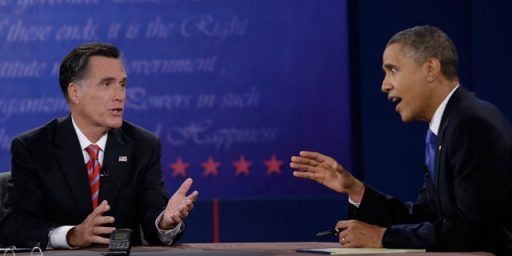Obama Cut Taxes? Really?
Remember that $400 tax cut President Obama gave you? Neither do 90 percent of Americans.
In a bit of political advertising helpfully disguised as a news story, NYT’s Michael Cooper points out that President Obama cut taxes for 95 percent of Americans but most of us are blissfully unaware.
In a troubling sign for Democrats as they head into the midterm elections, their signature tax cut of the past two years, which decreased income taxes by up to $400 a year for individuals and $800 for married couples, has gone largely unnoticed.
In a New York Times/CBS News Poll last month, fewer than one in 10 respondents knew that the Obama administration had lowered taxes for most Americans. Half of those polled said they thought that their taxes had stayed the same, a third thought that their taxes had gone up, and about a tenth said they did not know. As Thom Tillis, a Republican state representative, put it as the dinner wound down here, “This was the tax cut that fell in the woods — nobody heard it.”
Actually, the tax cut was, by design, hard to notice. Faced with evidence that people were more likely to save than spend the tax rebate checks they received during the Bush administration, the Obama administration decided to take a different tack: it arranged for less tax money to be withheld from people’s paychecks.
They reasoned that people would be more likely to spend a small, recurring extra bit of money that they might not even notice, and that the quicker the money was spent, the faster it would cycle through the economy.
Economists are still measuring how stimulative the tax cut was. But the hard-to-notice part has succeeded wildly. In a recent interview, President Obama said that structuring the tax cuts so that a little more money showed up regularly in people’s paychecks “was the right thing to do economically, but politically it meant that nobody knew that they were getting a tax cut.”
Apparently, in too many cases, the boost was more than taken away by other factors:
There are plenty of explanations as to why many taxpayers did not feel richer when the cuts kicked in, giving typical families an extra $65 a month. Some people were making less money to begin with, as businesses cut back. Others saw their take-home pay shrink as the amounts deducted for health insurance rose. And taxpayers in more than 30 states saw their state taxes rise, according to the Center on Budget and Policy Priorities.
But was the method — changing withholding rather than sending out rebate checks — the right one?
But at least one prominent economist is questioning whether the method really was more effective. Joel B. Slemrod, a professor of economics at the University of Michigan, analyzed consumer surveys after the last rebate checks were sent out in 2008 by the Bush administration, and after this tax cut, called Making Work Pay, went into effect under the Obama administration.
After the 2008 rebates, he found that about a quarter of the households surveyed said they would use the money primarily to increase their spending. After the Obama tax cut took effect, he said, only 13 percent said they would use the money primarily to increase their spending. The Obama administration believes that people did spend the money, and cites analyses calling the cut one of the more effective forms of stimulus.
For people for whom a $65 boost in household income makes a substantial difference, one presumes the money got spent. But, if the goal of the program was to stimulate the economy, rebate checks would have made more sense. After all, how stimulative is a tax cut that people didn’t know they got?
Slemrod notes, too, that a survey after the Reagan tax cuts showed that most Americans didn’t realize their taxes went down. My guess is that this is a function of the endowment effect. Most of us feel much more pain at losing money we already have than we do joy at receiving an equal amount of new money.







In 2008, Bush sent out checks of $600/$1200 for stimulas. Obama had $400/$800 disbursed through withholding. I’m not certain people are wrong to believe that Obama hadn’t cut taxes, or had kept taxes the same.
After all, how stimulative is a tax cut that people didn’t know they got?
Well, how stimulative is a cut people _think_ they got, but actually didn’t? How much of the Bush tax cuts have been rolled back by increases in state & local taxes to offset the loss of federal $$?
“…how stimulative is a tax cut that people didn’t know they got?”
Don’t quite follow your logic here James. The fact that most people are unaware that they got the money seems to indicate that it went right out the door before they realized it even arrived. In other words – it was spent immediately. Which would make it about as stimulative as it could be, no?
Heh. How many remember the one night drunken twist at a college party……….vs the long term honey?
“I’m not certain people are wrong to believe that Obama hadn’t cut taxes, or had kept taxes the same.”
Well, epistemologically, that’s kind of tricky. One the one hand, since the content of the belief is false, they are wrong in the belief. On the other hand, if questions of justification are at issue, the clouds roll in. See, Gettier problem.
Legion and Tano,
In the case of the Bush tax rebates, for which we didn’t qualify, there was a modest stimulative effect because people were expecting to get a check to spend, creating anticipation. It’s like the income tax rebate checks: People don’t view it as getting their own damned money back with no interest but as some kind of mad money from Uncle Sam.
And I’m sure that people who really needed an extra $65 a month spent it just as readily as they would a stimulus check. Most people, thankfully, are more fortunate than that. So, likely, it’s just money that went into their banking account by direct deposit. Maybe they spent it, maybe they didn’t. But not knowing you’ve got extra cash makes it hard to adjust your spending habits intentionally.
sam, if Bush gave a $600 tax credit his last year in office and Obama replaced it with a $400 tax credit, then all others things being equal, aren’t taxes paid under Obama higher?
The Obama tax credits didn’t go to the working poor, you had to make enough money to have federal income tax liability and withholding. (Also, those with over $75k AGI were ineligible)
In a bit of political advertising helpfully disguised as a news story
I am going to dissent in part on this count insofar as it does seem that a lot of people think that their taxes went up when they did, in fact, go down.
Now, I agree with you that the amount of the “down” wasn’t much and was largely unnoticeable. Indeed, at the time I thought that a far more dramatic withholding tax holiday would have been a better idea.
Still, I think it is legitimate news to note that contrary to the opinions of many, taxes have not gone up under the Obama administration and have, in fact, slightly gone down.
Now, they are about to go up, but not because of direct action of anyone, but rather because of inactive combined with a now decade-old political decision, but that’s another discussion.
Still, I think it is legitimate news to note that contrary to the opinions of many, taxes have not gone up under the Obama administration and have, in fact, slightly gone down.
Na-uh! The teabaggers told me that Obama was raising all their taxes, because he’s a dirty socialist, plus he’s going to get the government involved in their Medicare and Social Security, where government doesn’t belong! If they said it, it must be true.
PD, that’s not the question, is it? Taxes under the Obama plan may be higher than those under the Bush rebate, but they are still lower than they would have been absent the withholding restructuring, right? The claim, as far as I know, didn’t involve which cut was greater.
NPR’s Talk of the Nation had a pretty long discussion on the Obama tax cut V. the Bush Tax cut. What the gist of the discussion came down to was that:
1. Yes, a tax cut that people didn’t know they got is still stimulative. Money tends to be spent, whether you know you are getting more or you didn’t.
2. The method of Obama’s cut v. Bush’s cut was about as effective stimulus-wise (although the commentators offered no empirical evidence–something that is sometimes hard on radio).
3. Bush’s version is a bit more expensive to implement, but has a lot greater political dividends–everyone knows who is buttering their bread.
http://www.npr.org/templates/story/story.php?storyId=129753524
Sorry James, but it still doesn’t quite add up for me.
If you get $65 in one lump sum, with a ribbon tied around it, then you will decide to spend it or not. Given the situation most people find themselves in, it probably will be decided to save it somewhere.
If, on the other hand, you get $2 /day or $15 /wk without even knowing you are getting it, then it surely will get spent. If not, then it accumulates in your bank account, and, since you are under the impression that your income is stable, you figure you must have spent a bit less than normal, so you could go ahead and buy that movie ticket, or whatever.
I seem to recall some discussion at the time that these stealth tax cuts or rebates were made so precisely because they were more likely to be spent. than a lump sum (especially in a recession).
Politically Obama may have missed a trick (although even that’s questionable given the widespread Alzheimers in the American electorate) but whether people know it or not they pumped another 250-300 billion bucks worth of demand into the economy when it was reeling. That’s was and is the problem. DEMAND.
“I seem to recall some discussion at the time that these stealth tax cuts or rebates were made so precisely because they were more likely to be spent. than a lump sum (especially in a recession).”
Lump sums are much more likely to be used to boost savings or pay down debt. There are a ton of studies confirming this.
James: “After all, how stimulative is a tax cut that people didn’t know they got?”
I would say that’s an empirical question. For example, prices at a store generally are shown without including sales tax, however, the purchase *will* include that tax. So you would probably want to take into account ideas from behavioral finance like the endowment effect when trying to predict what the effect is, and you would likely need to run some experiments. For sure, however, sales taxes mean that the total budget of a taxpayer is lower, and therefore that the taxpayer cannot make as many purchases, and hence is anti-stimulative.
Considering most of the country thinks TARP was passed under Obama, I think the old Mencken quote about never going broke underestimating the intelligence of the American people is more true now than ever.
“For sure, however, sales taxes mean that the total budget of a taxpayer is lower, and therefore that the taxpayer cannot make as many purchases, and hence is anti-stimulative.”
Since consumption taxes of any sort are mopping up disposable income they are sure as hell anti stimulative.
” But, if the goal of the program was to stimulate the economy, rebate checks would have made more sense. ”
Really? George Bush sent me two. The first one didn’t prevent the second one and the second one didn’t prevent the (theoretical) third one. I think the rebate check idea has been tested…and found wanting.
The tax cut idea was great too, but as we can see….that has also not been very stimulative either.
sam, I think all answers are arguably correct:
Obama lowered taxes for most Americans
Obama kept taxes the same
Obama raised taxes for most Americans
I won’t argue any one of them is wrong.
I think the more interesting issue is how the tax credit could be stimulative if it didn’t offset the loss of the previous tax year’s stimulas check and if it wasn’t big enough to offset increases in other payroll deductions, particularly increased health care costs? It wasn’t additional money brought into the economy from 2008; it kept things from getting worse.
Maybe I am being dense here, but how is a change in withholding a tax cut? Isn’t it just a change in when you pay your taxes? It may be stimulus, but it is not any taxt cut that I can see.
FredW, I believe there is a tax credit that goes with the reduction in withholding. This would have been true of both the Bush and the Obama credit. The mail-out checks versus reduction in withholding were just different means of getting the credit out there before April of the following year.
I wonder how many people come April 15th found they owed more on their taxes than they did in previous years even if their income didn’t go up? Sure you cut the withholding amount, but unless you cut the actual tax rate, come tax day the government wants back what they’ve given you assuming no changes in your income.
I know this was the case for me this year. Our taxable income went down (my wife had less over time income and I upped my 401k contributions), yet the amount we owed to the feds went up. Bush I pulled this trick when the economy went into recession, IIRC.
And another point, the tax cut was for people making less than $75,000 (AGI IIRC) and if you made more than that on your joint taxes say, you’d definitely end up owing more on April 15th. If a household where both spouses made $50,000 filed taxes and didn’t notice the extra money in their paychecks and didn’t change their withholding as the tables changed they’d see that even though their AGI was the same they had to quite possibly write a check whereas in previous years they didn’t or even got money back. I’m sure in this case there were lots of people muttering, “That f—ing Obama.”